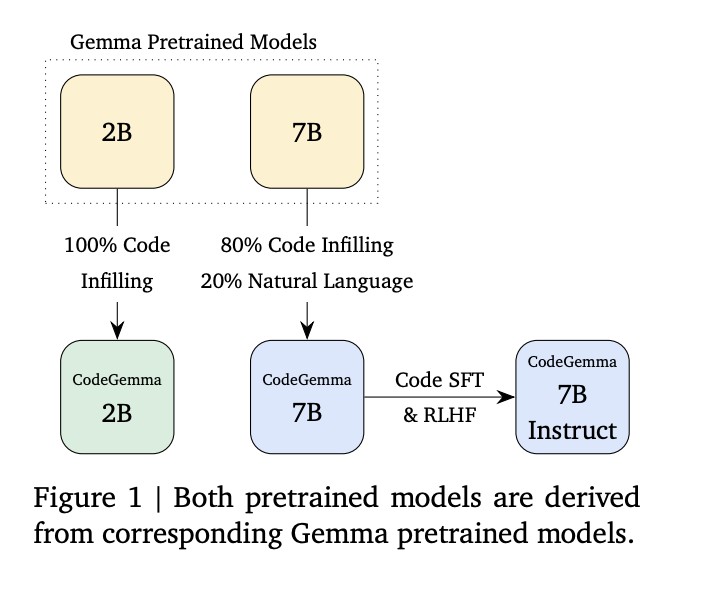In a significant move for the world of artificial intelligence and software development, Google has released CodeGemma, a cutting-edge suite of large language models (LLMs) dedicated to code generation, understanding, and instruction following. Developed to make high-quality code assistance tools more accessible to developers worldwide, CodeGemma marks a notable advancement in AI-driven programming aids.
Inside CodeGemma
CodeGemma is introduced as a family of open-access versions of the Gemma model, fine-tuned specifically for handling code. This suite includes three distinct models:
AÂ 2B base model, optimized for infilling and open-ended code generation, designed to offer fast and efficient code completion solutions where latency and privacy are paramount.
A 7B base model that integrates code infilling with natural language processing, thereby enhancing its utility for both code completion and understanding alongside language generation tasks.
Another 7B model for instruct following, allows users to engage in conversations about code, programming, and mathematical reasoning, making it an invaluable resource for developers seeking guidance or clarification.
A Leap in Performance and Accessibility
Each model within the CodeGemma family leverages the foundational strengths of the pre-trained Gemma checkpoints, further enriched by training on an additional 500 billion tokens spanning English language, mathematics, and various coding languages. This extensive training regimen has given CodeGemma exceptional capabilities in logical and mathematical reasoning, setting new benchmarks in code generation and completion.
The 7B model has demonstrated outstanding performance in various programming languages such as Python, Java, JavaScript, and C++. This proficiency is evident from its exceptional results on HumanEval and MultiPL-E benchmarks. Additionally, the model’s versatility and effectiveness have been established through its top-ranking position on the GSM8K evaluation.
A Catalyst for Collaboration and Innovation
The launch of CodeGemma is not just a technological advancement in AI, but it also signifies an invitation for collaboration within the developer community. Google intends to promote innovation and exploration by granting open access to these advanced tools, allowing developers to explore new horizons in software development.
Evaluating CodeGemma’s Impact
The introduction of CodeGemma to the AI and development community has generated a lot of excitement and high expectations. Its impressive performance on established benchmarks such as HumanEval and MultiPL-E for various programming languages underscores its potential to transform code generation and comprehension.
Furthermore, the inclusion of a model dedicated to instruction following (CodeGemma 7B Instruct) opens new avenues for developers to interact with AI more conversationally and intuitively, potentially easing the learning curve for new programming languages and concepts.
Key Takeaways:
Innovative Suite: CodeGemma introduces three specialized models for code generation, understanding, and instruction following, leveraging Google’s Gemma architecture.
Enhanced Accessibility: By offering open access to these models, Google aims to democratize AI-driven code assistance, making it available to a broader audience of developers.
Superior Performance: The models exhibit exceptional capabilities, outperforming counterparts in various benchmarks and setting new standards for AI in code generation and understanding.
Collaborative Potential: CodeGemma is not just a tool but a platform for innovation, encouraging developers to explore and expand the limits of software development through AI.
Check out the Paper. All credit for this research goes to the researchers of this project. Also, don’t forget to follow us on Twitter. Join our Telegram Channel, Discord Channel, and LinkedIn Group.
If you like our work, you will love our newsletter..
Don’t Forget to join our 40k+ ML SubReddit
The post Google AI Unveils CodeGemma: A Set of Open Code Models Built on Top of Gemma, Capable of a Variety of Code and Natural Language Generation Tasks appeared first on MarkTechPost.
Source: Read MoreÂ

